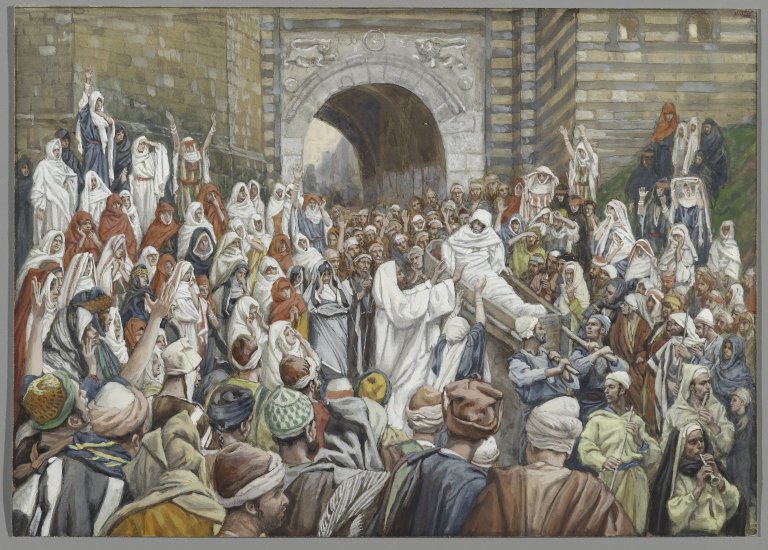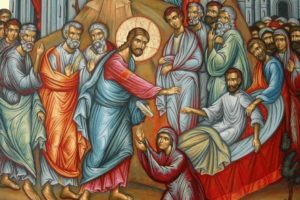In today’s gospel, Jesus travels to a town called Naim where he meets a funeral procession for a young man, “ the only son of a widowed mother.” There’s no particular reason for Jesus to have come to Naim. It was a little town southwest of the Sea of Galilee. He must have known there was a miracle to be performed here in this dusty little village.
The gospel says that when Jesus encountered the funeral procession he had compassion for the widowed mother. The Greek word used means to feel something deep down inside, in the entrails, which the ancient world thought of as the seat of emotions. It would be like getting bad news today and saying it felt like a punch to the gut. The point is that Jesus felt this compassion in the depths of his being. He touches the litter carrying the man and says, “Young man, I bid you get up.” The young man sits up and Jesus gives him back to his mother. Imagine her surprise and joy at seeing her son alive again. She had not only experienced the grief of his loss but the anxiety of wondering how she would live without her son to support her. Would she end up like Ruth and Naomi, gleaning leftover grain from the fields and barely surviving? Into this grief and anxiety comes Jesus. The people are astounded by the miracle and the gospel of Luke says, “fear seized them all and they began to praise God. A great prophet has risen among us and God has visited his people.” Jesus is revealed as a great prophet reminiscent of Elijah and Elisha who also raised the dead. Jesus had not yet revealed himself to the people as Son of God so this was high praise indeed.

What does this incident tell us about God? Remember, God, is exactly like Jesus who said,”If you’ve seen me, you’ve seen the Father.” So if we want to know what the Father is like we must look to what Jesus is like.
First, he is compassionate. He feels grief for the widowed mother deep inside himself, in the depths of his heart, as we would say today. This grief, this suffering is compassion. So god has compassion for us. He not only sees our suffering but, in a mysterious way, feels our suffering and like Jesus with the widow, comes to be with us in our pain. Whatever we experience, God is with us.
Second, Jesus raises the man unbidden. He knows the mother’s grief and steps in on his own initiative and rescues her son from death calling him from Sheol to life. God knows our suffering and intervenes in our lives in ways that are for our salvation. In the liturgy we thank god for “all that we know and that we do not know, the manifest and hidden benefits bestowed on us.” Saint Theresa of Avila said that the better way to pray was not to ask for things but to present our situation to God and trust him to act on our behalf. This trust in god is the faith Saint Paul talks about so much in his epistles.
Still, Jesus tells us, “Ask and you will receive; seek and you will find; knock and the door will be opened to you.’ Monsignor Romano Guardini says that God asks us to ask in order to give us” the dignity of being causes.” In our relationship with God, we are not just passive recipients of Grace; rather God shares his work with us and gives us the dignity of helping others through prayer.
Monsignor Guardini also says that it is inadequate to speak of God as the philosophers do, as the absolute, the immutable. Rather, God is “the near one…the close one” who re-commands the laws of nature out of love for his people.
The widowed mother met God and experienced his nearness, his closeness, and received a miracle. Let’s believe in God’s compassion so that we too can receive his healing touch.

